When a treaty was imposed on Hungarians in June 1920 and they lost two-thirds of their territory, people wept in the streets, declaring:"I believe in the resurrection of old Hungary!" And although they prayed to God for it, they looked for help in regaining the lost lands elsewhere ...
A well-known anecdote says that when, under pressure from the Third Reich, all its allies declared war on the US, the following dialogue took place between the Hungarian ambassador and a State Department official:
- Could Your Excellency once again remind you which country it represents?
- Kingdom of Hungary - replied the ambassador.
- And who is the king there? - asked the official.
- We don't have a king. The head of state is the regent, Admiral Horthy.
- Then what sea do you have access to?
- We have no access to the sea.
- Hmm ... - wondered the bureaucrat. do you have any territorial claims to the United States?
- No.
- And to the US allies?
- No.
- And to some other countries?
- Yes ... - said the diplomat - ... we have territorial claims to Romania, Slovakia and Germany.
- Then why don't you declare war on them? The astonished official asked.
- For God's sake! We can not! After all, these are our allies! The ambassador exclaimed.
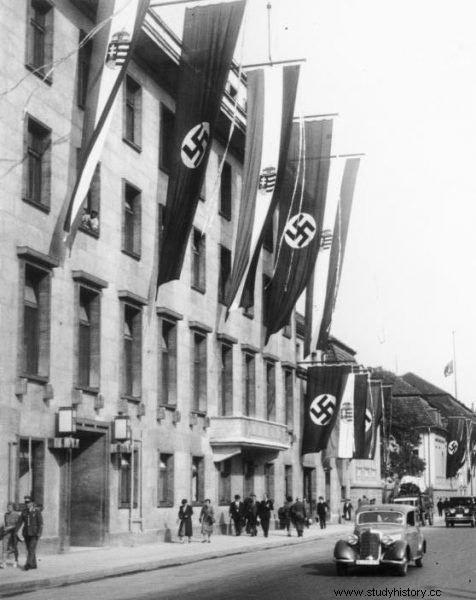
German and Hungarian flags are flown together on the streets of Berlin ... (source:Bundesarchiv, license:CC BY-SA 3.0 de).
Hungarian Paradise
The turn of the 19th and 20th centuries was an extremely good period for Hungary. After many devastating uprisings, happiness finally smiled on them. After losing the war with Prussia and Italy, the Austrians realized that their multinational monarchy was in danger of disintegrating. For the state to survive, they had to come to an agreement with some subordinate nations.
However, the Poles dreamed of a free Poland all the time, and the Czechs were bidding too much. On the other hand, Hungarians were willing to make a "good deal". A state called Austria-Hungary was established . What is most important for Vienna:the ruler, the army and foreign policy were common. The Hungarians became the prop to the throne and helped the Habsburg monarchy to recover from its internal crisis. In return, they were given extensive political, economic and cultural autonomy. 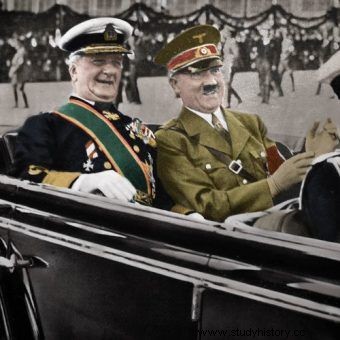
At the same time, the Hungarians carried out brutal magyarization of other nations inhabiting the Hungarian Basin. This led to increasing tensions. When it was certain that Austria-Hungary lost World War I, it turned out that Serbs, Croats, Slovaks or Romania no longer wanted to live together with the Magyars in one country. The chaos was further aggravated by the establishment of the Hungarian Soviet Republic and the intervention against it by the Romanian and Czechoslovak armies.
NO! NOT! NEVER! - NEM! NEM! SOHA!
Defeated Hungary on June 4, 1920 was forced to sign the treaty of Trianon . Under it, they lost almost two-thirds of the population (8 out of 21 million remained) and two-thirds of the country's territory (the remaining 93,000 km² out of 325,000 km²).
One-third of Hungarians went abroad. The army was significantly reduced. Hungary has lost access to the sea, mines, industry and much of its forests.
A country cut by unnatural borders had a number of economic problems. It was a huge shock for all Magyars. Soon the slogan:NEM! NEM! SOHA! Which said that Hungarians would never agree to the borders of the state created by the Trianon .
In the face of the crisis of the state in 1919, Admiral Miklós Horthy seized power in Hungary. He began his rule by fighting communists and social democrats. On March 1, 1920, he was recognized by parliament as regent of the kingdom.
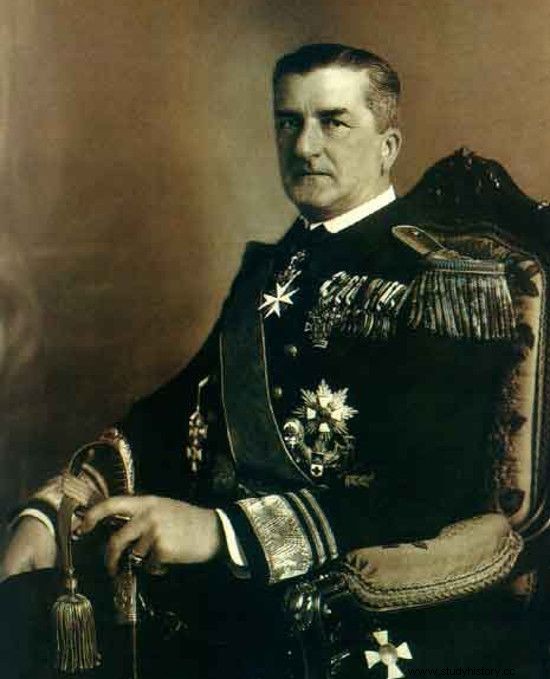
Admiral Miklós Horthy took full power in Hungary (source:public domain).
Horthy proved to be a skilful politician who was able to seize and hold full power in his hands. The year 1921 can serve as an example, when he twice prevented the return to the throne of Charles Habsburg. Hungary, along with the USSR, became one of the first dictatorships in Europe.
At the same time, they were secretly getting ready for a new war . For example, French money was counterfeited, and the funds obtained in this way went to the purchase of weapons. Various kinds of paramilitary groups and associations were organized. Sport and scouting were strongly promoted among young people.
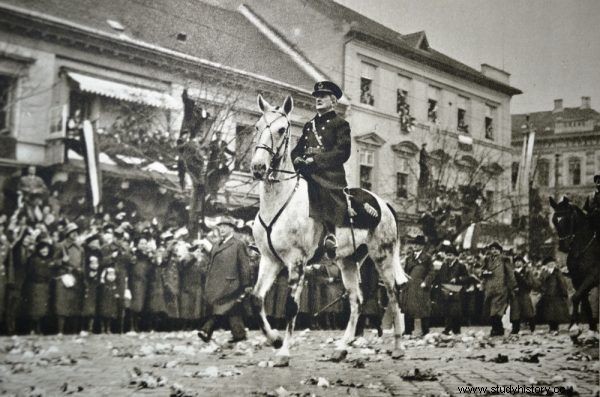
Horthy during his triumphal entry into Košice in November 1938 (author:Ladislav Luppa, license:CC BY-SA 3.0).
History began to gain momentum after Hitler came to power. As an ally of Germany, Hungary eagerly took part in the partition of Czechoslovakia . In this way, southern Slovakia and Transcarpathian Ruthenia returned to the Crown of Saint Stephen.
Balancing
Despite close relations with the Third Reich, the Hungarians did not agree to the proposals to take part in the attack on Poland in September 1939. What is more .
The Hungarians also decided to open their borders to refugees from Poland. Tens of thousands of civilians have found shelter on their territory. A significant part of the soldiers, thanks to the quiet consent of Budapest, could move further west to form a new Polish army there.
The approach to Poles, however, did not result only from the sentiment towards them. The Hungarians hoped that in the event of the Allies' victory, the help they provided to the Poles would be counted as a plus during the post-war peace negotiations.
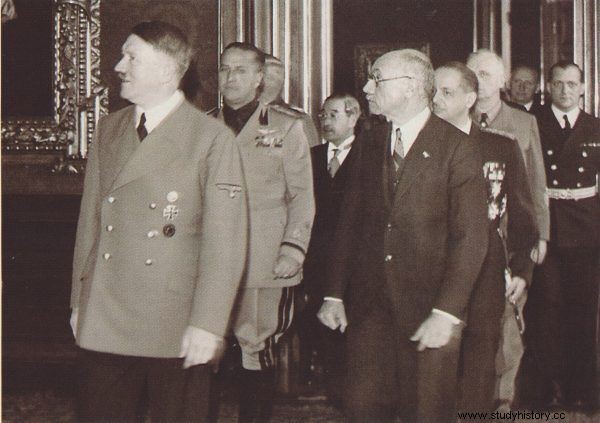
When you said A, you have to say B ... On November 20, 1940, Hungary joined the Pact of Three. In the photo:Adolf Hitler and Pál Teleki (source:public domain).
On August 30, 1940, the so-called Second Vienna Arbitration took place. The Germans decided to settle the Romanian-Hungarian dispute in favor of the Magyars . They received the northern part of Transylvania with an area of 43,104 km², inhabited by about 2.5 million people - mostly Hungarians. At the same time, on November 20, 1940, Hungary joined the Pact of Three.
The policy of Pál Teleki's government was to balance between the Third Reich and the Allies . To this end, he concluded a non-aggression pact with Yugoslavia. All the time Hungarians tolerated the activities of Poles on their territory:there were Polish schools and cultural institutions. Couriers with documents also moved freely from London to the occupied country. In this way, Hungary was to remain neutral during the Second World War for as long as possible.
The appetite grows with eating, which is why Pál Teleki's opinion was not shared by too many politicians in Budapest. Regent Horthy decided to break the non-aggression treaty signed by Hungary and attack Yugoslavia with Germany . Pál Teleki committed suicide as a sign of protest.
Disaster
After winning the war with Yugoslavia, Hungary captured Vojvodina, but found itself in open conflict with the Western allies . When Hitler attacked the USSR on June 22, 1941, Hungary also joined the attack, sending the 2nd Army to the Eastern Front. It was almost completely annihilated in early 1943. Influenced by Germany, Budapest also declared war on the United States.
Meanwhile, the Red Army was approaching the borders of Hungary. Regent Horthy knew his country was in danger of disaster. He was surrounded by the concept of abandoning the Third Reich and joining the victorious allies .
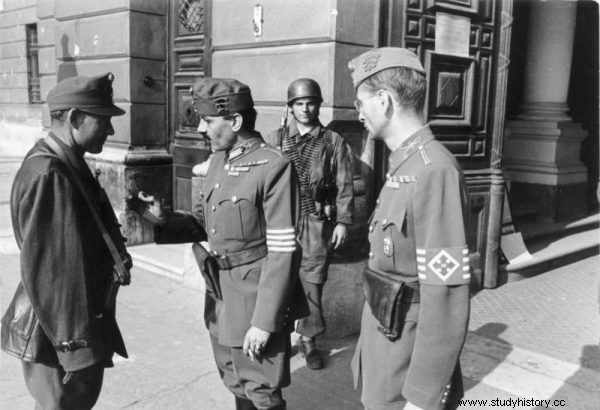
With the help of the Germans, the Arrow Cross took power in Hungary (source:Bundesarchiv, license:CC BY-SA 3.0 de).
The information about Budapest's attempt to negotiate with the USSR as well as Great Britain and the USA caused a reaction from Germany. On March 19, 1944, Wermacht entered Hungary . He encountered no major resistance. Despite this, the Hungarians continued to try to change fronts.
In October 1944, the regent's son was kidnapped by German commandos . The hostage was supposed to be Horthy's fidelity. However, the latter announced a ceasefire with the Soviets in a radio speech. However, the order did not reach most of the units. Inspired by the Germans, the Arrow Cross Crusaders - a pro-Nazi grouping, made a coup and seized power . They also introduced a reign of terror:they began hunting Jews and persecuting Poles who were still on the Danube.
In 1944, Romania, Bulgaria and Finland switched to the Allied side, while the Hungarian Arrow Cross Crusaders remained faithful to Hitler. It wasn't the best decision. Stalin's army laid siege to Budapest on December 29, 1944. After heavy fights on February 13, the capital city fell. However, Hungarian troops in the western part of the country did not stop fighting.
The Red Army seized the oil fields near Nagykanizsy. It was the last source of this raw material for the Third Reich. The elite Waffen-SS troops, in order to recapture them, went on to the last offensive in their history. The attack took place on March 6, 1945. The troops were moving south of Lake Balaton. Ultimately, they were even supposed to take back Budapest, but it did not work. The Red Army, despite numerous losses, went on a counteroffensive and took over the whole of Hungary.
World War II ended badly for our nephews . Not only did they lose the territories regained in 1938-1941, but the communists took power in the country. Hungary was transformed into a puppet of Moscow and, along with other demoludes, had to wait until 1989 to regain full independence.
